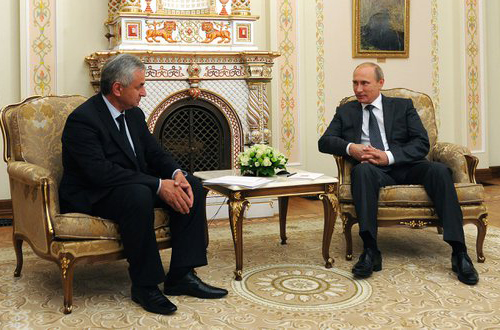
Moscow’s Attempt to Annex Abkhazia Serves as a Bitter Lesson to Russia’s Friends and Opponents
Moscow’s Attempt to Annex Abkhazia Serves as a Bitter Lesson to Russia’s Friends and Opponents
On October 13, the Kremlin unveiled the so called “Agreement on Alliance and Integration” between Russia and breakaway Abkhazia (see EDM, October 23). To summarize this long and verbose text, the new treaty envisages a gradual but ultimately complete merger of the separatist region’s defense, law enforcement, customs, border, economic and healthcare agencies with those of the Russian Federation’s within a three-year time period (apsnypress.info, October 13). In other words, the agreement’s language lays out a blatant attempt to administratively annex Abkhazia into Russia proper. The Abkhazian separatist “parliament” was given two weeks to discuss the treaty. However, Moscow does not expect any negative reactions from Sukhumi about this agreement (vedomosti.ru, October 13). And indeed, it is difficult to imagine what Tbilisi can do to avert this looming annexation of Abkhazia—a region where thousands of Russian occupation troops are stationed.
This latest Russian step to annex Abkhazia sheds light on a number of developments from the recent and more distant past that fully reveal the true nature of the Kremlin’s policy toward Abkhazia and the rest of Georgia over the last 25 years. To begin, it has now become plainly clear who was behind the ouster of Abkhazia’s separatist president Alexander Ankvab in May–June 2014 (see EDM, June 12). Moscow’s recent attempt to incorporate Abkhazia clearly indicates that, in fact, it was the Kremlin that was behind the opposition-led protests, which pushed Ankvab out of power. Undoubtedly, Ankvab was a pro-Russian separatist leader. However, Moscow needed someone even more pro-Russian, more anti-Georgian and more obedient in order to smooth the way for the forthcoming incorporation of the breakaway region into Russia. Ankvab’s ouster was, therefore, the first step on this path. The second step was the ascent to power of Raul Khajimba, a renowned anti-Georgian antagonist and former KGB officer (see EDM, September 3), who campaigned for a long time for even closer Abkhaz-Russian ties. In fact, he previously hinted at a possible incorporation of occupied Abkhazia into the Russian Federation. With Khajimba safely in place, Moscow has now moved to annex the region. Needless to say, Khajimba is fully compliant, clumsily trying to conceal his real intentions with talk on “Abkhaz sovereignty” and “the interests of the country” (Civil Georgia, October 23).
However, the implications for Moscow’s latest attempt to merge Abkhazia with Russia goes beyond installing a new separatist regime in Sukhumi. By revealing the “Agreement on Alliance and Integration,” Russia, in fact, showed that its decades-long talk about the “self-determination” and “sovereignty” of Abkhazia was nothing more than a way to deceive Abkhaz separatists and sabotage Georgia’s territorial integrity and statehood. So currently, Russia is apparently doing what it always intended to do: annexing Abkhazia and finally dismembering Georgia. This Russian goal has never been in doubt for most Georgians. Abkhazian separatists, however, might feel disappointed, if not outright deceived by the Kremlin’s latest move. The separatist regime is trying its best to conceal the voices of displeasure within its ranks from those who openly oppose the latest treaty (Civil Georgia, October 15). However, they are likely in for a rude awakening, as they, as well as all Abkhazian separatists are now realizing that they have been played and used by the Kremlin for years.
This looming annexation of Abkhazia has even more far-reaching implications. Specifically, it paves the way for the annexation of the Tskhinvali region (South Ossetia). Out of two Russian-occupied Georgian regions, Abkhazia was always considered the harder case—meaning that whichever side managed to solve the Abkhazian question in its favor, the Ossetian question would simply follow suit. So by annexing Abkhazia, Moscow will automatically “solve” the Ossetian question as well, effortlessly incorporating the Tskhinvali region. Notably, the Ossetian separatist regime has been calling for a merger with Russia for quite a long time now (netgazeti.ge, June 24).
Furthermore, the Russian plot to annex Abkhazia once again shows to everyone that Russia is neither willing nor capable of having normal relations with Georgia or any other small, (and especially) neighboring country. Despite the current Georgian government’s conciliatory and often servile policies to normalize ties with Russia, good relations with Moscow seem to be little more than an illusion. By its recent attempts to incorporate Abkhazia, the Russian government again made it plainly clear that it is not seeking truly normal, friendly ties with Tbilisi. Rather, Moscow needs unconditional obedience from smaller countries like Georgia, clearly wanting them to remain firmly within Russia’s political-economic orbit. An unresolvable bone of contention between the two continues to be Tbilisi’s desire to join the North Atlantic Treaty Organization (NATO) and European Union. In fact, before Georgia signed the June 27 Association Agreement with the EU, Moscow plainly warned Tbilisi that there would be consequences for this step (see EDM, May 29). It appears that the Kremlin is now making good on that threat.
Overall, Russia’s recent move toward annexing Abkhazia contains valuable lessons for Moscow’s friends and opponents alike. First, Russia’s support for any ethnic group, small of large, is always illusory or part of a deeper agenda. Notions of “self-determination” and “independence” are just slogans in the Kremlin’s hands in order to undermine countries like Georgia. Second, any “independent” Russia-backed regime is just a temporary tool in Moscow’s hands, which can be dismissed and replaced as the need arises. Third, the Kremlin does not strive to establish normal relations with neighboring countries, especially small ones—rather, Moscow demands complete domination, and when not obeyed, it may choose to tear that country apart as it has done on multiple occasions. As the imperial ambitions of the current revanchist regime in Moscow continue to grow, the world will need to assess and learn from these lessons if it wishes to respond appropriately.


